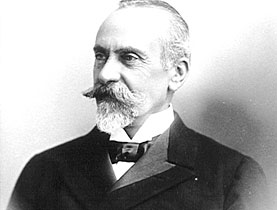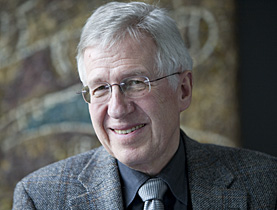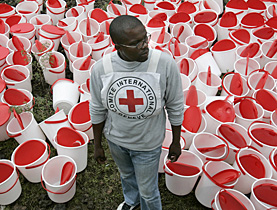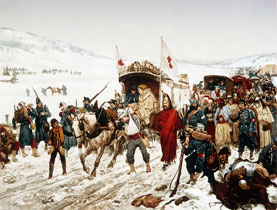Geneva Conventions ushered in respect for rules

The International Committee of the Red Cross founders were instrumental in promoting humanitarian law, an expert says on the anniversary of the Geneva Conventions.
François Bugnion, a specialist in humanitarian law, worked for the Swiss-run ICRC for 38 years. He tells swissinfo.ch how the founders of the Geneva Conventions wanted to create “totally new” rules for protecting civilians.
This year marks the 150th anniversary of the battle of Solferino, which led to the first Geneva Convention. It is also 60 years since the Fourth Convention on the Protection of Civilians.
Bugnion served as head of international law at the Geneva-based ICRC and now works as an independent consultant.
swissinfo.ch: What is unique about the Geneva Conventions?
François Bugnion: [ICRC founder] Henry Dunant and the other founding fathers of the first Convention wanted to create something totally new. Actually, rules did exist to limit wartime violence, the oldest of which dated back to before the Middle Ages. But these traditional rules applied only to a given world, be it the Christian or Muslim world for example. When these two worlds clashed, these rules no longer applied.
The great innovation by Henry Dunant and the International Committee of the Red Cross was to found [in 1876] a law based on the agreement of all parties and not on behalf of a deity or something else. These written rules in the law could be disseminated and applied universally.
In fact, the first Convention of 1864 was the starting point for all international humanitarian law, including the Hague Conventions of 1899 and 1907.
swissinfo.ch: Does there have to be a disaster for humanitarian law to progress?
F.B.: In this area as in others, individuals, let alone states, are more reactionary than anticipatory. Thus, after the First World War, the ICRC immediately launched a review of the Geneva Convention for the Protection of Prisoners of War and Civilians. This project resulted in part in the 1929 Conventions. However, states were not ready to follow the ICRC’s steps to protect civilians, who died in very large numbers during the Second World War.
The paradox of the Second World War was that it was the scene of many atrocities that culminated in the Holocaust, but all the while certain rules were respected, like those concerning prisoners of war or the [1925] Prohibition of Chemical Weapons in fighting.
By February 1945 the ICRC began discussions to revise the Geneva Conventions, which resulted notably in 1949 in the Fourth Convention on the Protection of Civilians and Article 3 of the Conventions on Non-international Conflicts. Which is quick given the context of the time [the beginning of the Cold War]. At that time, the ICRC was convinced a Third World War would break out.
Finally, conflicts related to decolonisation [Indochina, Algeria, Kenya, South Africa, Vietnam] prompted states to supplement the 1949 conventions with the additional protocols of 1977.
swissinfo.ch: Is it possible to assess the impact of humanitarian law on the conduct of wars?
F.B.: In inter-state conflicts between comparable forces [India and Pakistan, Israel and the Arab countries, the Falklands War, the first Gulf War], most prisoners of war have been protected and the emergency services spared. Even if all the rules of humanitarian law were not respected.
In internal conflicts or in those with both domestic and international [elements] like the Vietnam War, it is clear that humanitarian law has been violated.
As [Prussian soldier Carl von] Clausewitz said, war is a violent relationship and there is no limit to this violence. It is about imposing one’s law on another. It is a dynamic that usually results in extremes. Humanitarian law is the last bastion against the rise of extremes. On the occasion of the 50th anniversary of the Geneva Conventions, the ICRC conducted a survey of 20,000 people, civilian victims and prisoners of war. And the vast majority said that humanitarian law was their only protection.
The great challenge today is to incorporate new forms of violence into an international legal framework, the risk being to reject some enemies and not to apply the rules of law to them. But if you outlaw people how can one expect them to follow the rules?
swissinfo: Human rights and humanitarian law are officially at the heart of Swiss diplomacy. How long has this been the case?
F.B.: When Switzerland was requested by the Geneva Committee [later the ICRC] to convene the diplomatic conference of 1864, Bern did not hesitate to agree. But according to records from the time, the cabinet handed most of the organisation back to the Geneva Committee. It should be noted that the committee included the most prestigious Swiss citizen of the time, General Dufour, the enlightened winner of the Sonderbund war who had connections to Napoleon III, the most powerful man in Europe at the time.
After this first step, Swiss diplomacy became more involved in the defence of humanitarian law in 1917 with the arrival in the cabinet of Gustave Ador following a very serious Swiss foreign policy crisis occasioned by the resignation of Arthur Hoffmann [involved in the peace separation agreement concluded between Germany and revolutionary Russia].
Ador, the president of the International Committee of the Red Cross, took on the foreign ministry post in the cabinet. Heavily involved since the beginning of the First World War and the inspiration behind the International Agency for Prisoners of War, Ador in his new role would pursue a mission of good offices aimed particularly at humanitarian issues such as the Franco-German agreement of 1918 on improving the living conditions of prisoners of war.
At the end of the Second World War, cabinet minister Max Petitpierre developed the concept of active neutrality, that is using a neutral country status to help victims of war. An idea that has been resurrected in recent years, particularly by [Foreign Minister] Micheline Calmy-Rey.
Frédéric Burnand in Geneva, swissinfo.ch
17 February 1863: First meeting of the International Rescue Committee for Wounded Soldiers, which in 1876 became the International Committee of the Red Cross.
22 August 1864: Adoption of the first Geneva Convention.
17 June 1925: Protocol on the Prohibition of Chemical Weapons.
27 July 1929: Revision of the Geneva Convention and the Convention on Prisoners of War.
12 August 1949: Adoption of four conventions protecting soldiers who are wounded or fall sick on land or at sea, prisoners of war and civilians.
8 June 1977: Adoption of the Protocol on the Protection of Victims of International Armed Conflicts and Internal Conflicts.
18 September 1997 Ottawa Convention on the Prohibition of Anti-personnel Mines.
17 July 1998: Adoption of the Statute of the International Criminal Court.
30 May 2008: Adoption of the Convention on Cluster Munitions.
Switzerland became a holding state for multilateral treaties after the development of the first Geneva Convention of 1864.
In this role, Switzerland must keep the original version of the treaty complete with handwritten signatures and seals and send certified copies to all state parties, and register ratifications by states not involved in the negotiations.

In compliance with the JTI standards
More: SWI swissinfo.ch certified by the Journalism Trust Initiative














You can find an overview of ongoing debates with our journalists here . Please join us!
If you want to start a conversation about a topic raised in this article or want to report factual errors, email us at english@swissinfo.ch.